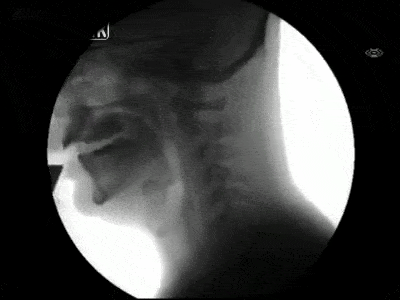The only healthcare employees allowed to operate a fluoroscopy machine are Physicians and licensed technologists.
What is a Fluoroscopy Used For – Fluoroscopy Meaning?
Fluoroscopy is a study of moving body structure.
It is all about medical imaging that displays a continuous x-ray image on a TV-like monitor and shows the body parts and their motion in detail.
It is achieved by passing a continuous x-ray beam through the specific areas of the body.
In other words, for this particular method, there is no need to take or develop x-ray images.
The body parts are seen in ‘real-time’ rather than as a snapshot image. Doctors use this imaging test (fluoroscopy) to assess how your organs and tissues work.

Who Can Operate a Fluoroscopy Machine?
This fluoroscopy process is painless, but its procedures aren’t so straightforward.
Only a licensed radiographer practicing under a certified doctor can perform fluoroscopy, as it involves high patient radiation doses.
If this process isn’t done correctly, it can create harmful biologic effects like ‘Stochastic’ and ‘Non-Stochastic.’
For a list of fluoroscopy procedures, see this post.
Who Is Allowed To Use Fluoroscopy In Imaging
Most people think that Fluoroscopy is used by professional radiologists only.
This isn’t true at all.
Many types of doctors are allowed to use this imaging test. It is very helpful for them in diagnosing illnesses and guiding certain treatment procedures. For example,
The Radiologists
They are medical doctors who are experts in using medical imaging (radiology) procedures.
They often work in a team and are assisted by a radiologic technologist, a healthcare provider who performs imaging procedures and ensures the patient receives the best possible healthcare treatment.
The fluoroscopy technology heralds from the department of radiology. Therefore, they are the best and most professional people for this x-ray imaging procedure.
The Urologists
These physicians treat diseases of the urinary tract and the male reproductive system.
It has a branch called ‘Endourology,’ which deals exclusively with laparoscopic surgery.
That’s why some institutions require urological surgeons to study and use fluoroscopy.
But a fluoroscopy session can be administered by a professional radiographer, too, if a urologist doesn’t understand how to use the machine.
The Cardiologists
Cardiologists diagnose and treat heart diseases. Many of them, including Interventional Cardiologists, are trained to perform fluoroscopy too.
For that reason, cardiologist-operated fluoroscopy exists.
Interventional cardiologists must specialize in imaging techniques; they have to master various tasks, such as managing radiation doses, for the safety of their patients.
The OB/GYN Docs
Obstetricians-Gynecologists. These doctors specialize in the medical and surgical care of the female reproductive system.
They care for women during their pregnancy and just after the baby is born. These doctors are also allowed and trained to do fluoroscopy.
Experts believe that great progress has been achieved with the use of fluoroscopy in Gynecology. It facilitates them in dealing with severe conditions during pregnancy.
There are some other doctors too who commonly use fluoroscopy, such as Gastroenterologists, Orthopedic Surgeons, etc.
On the whole, it depends on the medical fields and their requirements for the safety of patients. Since, in some cases, you can’t solely count on a radiographer to perform fluoroscopy.
For example, in Gynecology, it is important to give an enema in the evening before the examination. Furthermore, the radiation dose also matters in prolonged fluoroscopy sessions.
This is something only a professional, trained gynecologist can comprehend. Any miscalculation in these things can affect pregnancy.
But mostly, the imaging team includes the physician, radiologic technologist, physicist, and other medical personnel. All of them are trained and in charge of developing optimized protocols.
Can nurse practitioners use fluoroscopy? Depends on their training.
Fluoroscopy – Prepare for a Fluoroscopy Certification & Permit
It doesn’t matter whether you are a professional radiographer or a physician; if you aren’t trained and not a state licensing candidate, you are not allowed to use fluoroscopy.
Now, there are still a handful of states in America that do not require any licensure whatsoever. But their days are numbered.
Most hospitals require that you must obtain a state license post certification from the ARRT after studying radiation and having specialized training in the proper use of it.
Without appropriate training, you cannot work as a radiologic technologist and use fluoroscopy, as you and the patient can be exposed to radiation levels.
California Fluoroscopy Exam
The state’s ARRT’s fluoroscopy exam is for only those candidates who have relevant foundational qualifications, such as physicians, physicians’ assistants, and radiologic technologists.
It isn’t designed and required for x-ray machine technicians (limited x-ray techs), medical assistants, or other medical personnel.
To pass the ARRT’s exam and acquire a state’s fluoroscopy license, you need to study and know about the specific instructions related to:
- Patient dose reduction & the risks of fluoroscopy
- Occupational dose reduction
- Image recording & benefits of fluoroscopy
- Quality control of fluoroscopy equipment
It is the medical facility’s responsibility to ensure you have the state license and are eligible for fluoroscopy examination.
Why The Certificate or Permit Is Necessary?
It is necessary due to many reasons.
First, the procedures may vary depending on your condition and practices. Second, if you don’t have a license or a permit, it would be immensely tough for you to comprehend how to work on different major tasks and ensure that the fluoroscopy examination is accurate.
For example,
- Generally, you ask the patient to remove any clothing or jewelry that can get in the way of the examination. This is for radiation protection and safety.
- In some fluoroscopy procedures, a contrast substance is needed better to visualize the organs or structures of the body.
- Similarly, your certificate and the practices in the hospital teach you about the patient’s position on the x-ray table. Sometimes you have to move their entire position rather than moving a certain body part. You also have to teach them how to hold their breaths for a short time during the fluoroscopy session.
- Anxious patients, particularly children, might need to have a light sedative. It helps them relax and stay still.
- In advanced medical imaging modalities, you have to do a bit more for fluoroscopy; any fluid in the joint can be aspirated before the contrast dye, or a needle can be put into the elbow or other sites for the procedures that require catheter insertion.
- There are some special fluoroscopy procedures, too, that are associated with long exposure times and high radiation doses.
Proper fluoroscopy training teaches you about all these things.
Understanding The Risks
If you are allowed to use fluoroscopy in imaging, it means you understand all the risk factors associated with it too. We are not saying that complications in this field are common. However, some medical procedures involve risk and potential complications.
Excessive radiation exposure can increase the risk of cancer.
Therefore, in fluoroscopy, the care team always follows strict standards for x-ray techniques. Especially concerning pregnancy, they use the smallest amount of radiation as they perceive radiation often causes birth defects.
Are Nurses In The OR Allowed to Fluoro?
The short answer is ‘No.’ Nurses aren’t allowed since it is not in their scope of practice to perform fluoroscopic procedures.
If you are a nurse, you should research the regulation for the state you are in.
This will determine the extent of what applies to your situation.
Conclusion
Every person who is allowed to use fluoroscopy is should be certified by the ARRT.
A radiographer has to pass the national test, as well as meet specific state requirements, to use fluoroscopy in imaging.
____________________________________________________________

